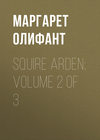Buch lesen: «The House on the Moor. Volume 3», Seite 6
CHAPTER X
WHILE Roger Musgrave travelled full of hope and pleasant anticipation towards Milnehill, Roger’s mother had been mourning over her dead husband. And now, while that happy evening party gathered in Colonel Sutherland’s drawing-room, the widow and her little boy were spending the slow hours together in the warm parlour, where Edmund spent his invalid childhood. His father’s death had given a shock more than it could bear to the nervous and weakly frame of the ailing child; his father was dead, and he was the heir. An unnatural excitement stimulated the precocious little mind, and rose to fever in the throbbing pulse and little pinched cheeks, now flushed with a hectic brightness. The little fellow had visions too magnificent to be safe, and projects as wild and impossible, as they were childish and simple-hearted. After the first pangs of his childish grief were over, Edmund, who knew nothing about guardians nor minority, began to speculate splendidly what he should do with his new wealth. He poured into his mother’s ears a flood of intentions, vain, lavish, childish dreams of universal help. He was to send for Roger and give the greater half of all he had to his elder brother; he was to get everything she could desire for Mrs. Stenhouse; he was to send a present of the most beautiful horse in the world to Colonel Sutherland; and henceforward they were all to live together, and “my brother Roger” was to be supreme in the joint household. Mrs. Stenhouse, afraid to check him, and at the same time trembling for the effect of this excitement upon his weak frame, looked on with a troubled heart. She knew Edmund would not get his wild will now, as he supposed he should. She knew very well that nobody would permit him to do a tenth part of what he meant to do. But when he roused himself up out of his chair with that light of pleasure on his face, and that hectic flush which she persuaded herself into supposing “a healthy colour,” and amused the languor of his lonely days with these imperative fancies, what could the poor woman do who had been his bondwoman and servant so long? And then she was full of sorrowful thoughts about “his dear father,” as Mrs. Stenhouse now called the careless partner of her life, mourning him as many a man is mourned who does little to deserve that remorseful tribute of late affection. Now that he was gone, she thought it must have been her own fault that they did not get on better; and it grieved her to find how impossible it was to check Edmund into sadness, and to make him feel that the loss of his father was a matter far more important than his supposed mastery of his father’s wealth. Edmund had cried all his tears out the first day, and had no more lamentations to make.
“What do you cry for?” he exclaimed at last, impatiently; “aren’t you glad to send for Roger, and have him at home? I shouldn’t wonder if he’d join the Edgehill Cricket-club, and get to be captain of the eleven – wouldn’t it be famous. And I mean to get strong, I can tell you, mamma. I don’t mean to live in this stifle and coddle, now I’ve come into my fortune; for papa said it was all for me.”
“Oh, Edmund, dear child, your father was so fond of you!” cried the poor mother; “have you no thought to spare for him, now that he is gone? He loved you more than everything in the world. I wish – I wish you would think more of him than of what he leaves behind.”
Little Edmund looked up keenly at the weak, weeping, timid woman.
“Were you fond of him yourself?” said the child, half suspiciously; “now you love him and cry about him; but it is different with me. He was very good to me, was papa,” continued the little man, with a reluctant tear in the corner of his eye; “but all of you say he’s a deal better off now, and that we’ll see him again. If that’s true, why do you cry? – and besides, mamma, I used always to think that you liked Roger’s father best.”
Mrs. Stenhouse covered her face with her hands, and only cried the more; she was vexed, humiliated, and ashamed, as well as full of grief. It seemed somehow sacrilege to speak of Roger’s father to the son of her second husband; and Roger’s father was little to herself now but a bright, brief dream of her girlhood, too short, too happy to influence her life. Now the second, longer, harder, more serious portion of her existence had concluded also; but while she sat crying these tears of mortification and wounded feeling, some one beckoned her to the door of the room and gave her some letters. One of these was from Roger himself, announcing his arrival, and that he had gone to Milnehill; for Roger as yet did not know what had happened in his mother’s house. This surprising announcement raised her out of her distress in a moment and dried her tears. A thrill of new freedom ran warm through her heart, stirring the blood in her dull veins. Roger, her first-born, whom she had not seen since he was almost a baby – whom Mr. Stenhouse smilingly disliked, and would not permit to come there – Roger, her brave soldier, her handsome boy! Now she could have him under her own roof, without asking anybody’s permission; now she could enjoy her son’s society in fullest freedom. Poor soul! it gave her a compunction to feel how glad she was; but she could not deny even to herself how exquisite for the first moment was that unaccustomed delight.
“Oh, Edmund, darling, look here!” cried poor Mrs. Stenhouse, crying again, but this time with joy; “Roger has come home —your brother, my love;” and with an outcry of mingled terror, compunction, and delight, to feel herself daring enough in this house to pronounce these words aloud, Mrs. Stenhouse thrust the letter into Edmund’s hands, and relapsed once more into tears.
Her other letters had fallen on the floor at her feet. When Edmund had finished Roger’s, his inextinguishable childish curiosity discovered these. His mother was still crying, and he was her lord and master, the autocrat acknowledged and apparent of the house; he slid out of the easy chair as a cripple slides, and snatched up the nearest. Though it was addressed to Julius Stenhouse, Esq., the arrogant little imp did not hesitate to tear it open; but he did it with some haste, to make sure of the epistle before his mother uncovered her eyes. It was a communication somewhat puzzling to brains so young. Edmund, though his pride would not acknowledge it even to himself, did not understand half of Mr. Pouncet’s letter, but he gleaned enough out of it to know that something that concerned Roger had been a subject of importance likewise to his father and his father’s friend; and that the writer of the present epistle, which had, it appeared, been delayed in the transmission, was in a state of considerable alarm and trepidation about something. What it was that Mr. Pouncet feared Edmund could not make out, but he jumped at the conclusion that something was wrong as rapidly as Susan had done. Afraid! – why should a man be afraid? – Roger wasn’t. Roger was the epitome of Edmund’s faith. He had been badly educated, this poor child. He knew very little in heaven or earth save his prayers and Roger, and trusted in nothing as he did in that unknown, never-to-be-acknowledged, secret, invisible brother, whom his mother told him of in whispers, and whom he thought of by day and dreamt of by night. Now glorious times were coming. Papa and this other man, whose letter rather baffled Edmund, had doubtless entertained some project of keeping Roger down; but behold the tables were turned, the conspirators were cheated, and the details of the complot had fallen into the hands of Roger’s little knight and defender. True, he did not understand them very well, but still they were here.
“Roger shall come home directly,” said the little despot, waving aloft in his hand these two epistles. “I’ll give him half of all my money, mamma. He shan’t go for a soldier any more; and I’ll find out if anybody wants to do him any harm, and punish them, I will! Look here; it’s something about Roger, but I don’t quite know every word what it means. You can’t tell any more than me. I say, mamma, let’s have Scarsdale here, and ask him.”
“What is it, love?” asked Mrs. Scarsdale, wiping her eyes.
“I wish you’d mind what one says,” cried the impatient little invalid. “I told you I didn’t know quite all it means, neither could you if you was to try. Mamma, ring the bell and send for Scarsdale – he’s got no master now but you and me; send and tell him I want him, and he’s to come directly. Mamma, do you hear?”
And when Mrs. Stenhouse had glanced over the letter, which she did understand rather better than Edmund after all, she thought the boy’s suggestion wise. She had not the smallest gleam of discrimination in respect to character, and to be Colonel Sutherland’s nephew was enough to give her a blind confidence in Horace; and as to the possibility of acting for herself, that did not enter into the poor woman’s head. She sent for Scarsdale accordingly, not in little Edmund’s imperative mood, but with a pleading message that Mr. Scarsdale would be so very good as to come to her as soon as it was quite convenient for him, as she was so anxious to consult him about a letter she had received. Her heart beat higher in her breast that day with a deeper individual throb than it had known for many a previous year; a little flutter of tumultuous independence was in her mind; she would receive Roger into her own house unreproved; she seemed on the very eve of finding out something which might be of service to that cherished but unknown son; and her whole nature was stimulated by these unaccustomed hopes.
CHAPTER XI
IN Mr. Stenhouse’s office, where affairs were being wound up, Horace Scarsdale held his clerk’s place in greater personal discomfiture than he had ever previously known. Mr. Stenhouse’s executors knew of nothing extraordinary in the position of this young man. His mysterious prospects were totally unknown to them, and he had no secret to hold over their heads and enforce his claims withal. To them he was only the newest and least acquainted of the lawyer’s clerks, and nobody cared for his black looks and assumptions of superiority. He remained reluctantly at his desk, because he could not afford, in present circumstances, to sacrifice the salary which would shortly be paid to him, nor could he make up his mind, in spite of all the dark excitements which distracted him – the fascination of enmity and evil purpose which bound him to Marchmain, and the covetous and tyrannous impulse which placed so plainly before his eyes his power over Mr. Pouncet – to leave the place which contained Amelia, and where alone he had any likelihood of seeing her. After their last interview the lover was daring enough to have stood upon small punctilio at the next meeting. But Mrs. Stenhouse’s door was still decorously closed, and Stevens, at the present moment much more disposed to take Master Edmund for the tyrant of the house than Miss Amelia, was inexorable, and gave no admission. Mrs. Stenhouse’s message accordingly found the young man in a propitious mood. He made haste to obey it, extremely indifferent as to the subject of the consultation, but deeply excited with the more personal emotion of once more finding himself under the same roof with the lady of his love.
Mrs. Stenhouse would willingly have seen him alone, feeling instinctively that little Edmund’s interference was not quite expedient here; but she had submitted her inclinations too long to that small autocrat to have any chance of freedom now. It was accordingly into Edmund’s parlour that Horace was shown. There was still a fire warming into a state of semi-suffocation that invalid chamber; and there sat the child, consciously regnant and despotic, with his eager eyes blazing out of his sharp little face, and the hectic flush upon his cheeks. The mother watching always, to whom Edmund’s illness had become quite a domestic institution, a thing which should last for ever, saw no change save of improvement; but the cold stranger’s eye saw differently. The little blade was wearing out its tiny sheath – all this excitement was too much for the feeble little body; and as distinctly as the doctor, highly skilled and richly feed, who should come down from town after awhile to pronounce the child’s death-sentence, Horace perceived that before he could do one of the splendid things he purposed, little Edmund, like a shadow, should have faded away.
But Horace thought no more of Edmund when he cast his eyes upon the letter which Mrs. Stenhouse hurriedly and with agitation put into his hand: —
“Dear Stenhouse – I wish fervently I had broken my leg or taken a fever on that unlucky day when I was persuaded into that Tinwold business of the coal-pits. I have never had a moment’s repose or comfort since, and from the day that young Scarsdale poked his inquisitive nose into the business everything vexatious in life has clustered about this unfortunate affair. I do not deny that it has paid very well as a speculation, but the profit twice over would not have paid for the annoyance which first and last it has caused to me. This morning I have a letter from Sir John Armitage. It has oozed out, somehow or other, through young Scarsdale doubtless, that there is an old man somewhere in the district who knows some secret worth telling about young Musgrave. It is true, they have not an idea what it is, but Sir John charges me with the duty of searching it out and ‘doing the boy justice.’ Armitage of Armitage Park, my father’s clients before mine – one of the oldest families in the county! I know his affairs better than he does himself; and he dares not cut down a tree on his estate without consulting me; yet he breaks forth upon me as peremptory and absolute about this miserable business as if I could set it all square in a day. It is all very well for you, you are out of the way; you are never appealed to; the Musgraves never cross your path; but I am aggravated entirely out of patience. Would to heaven that I had never heard of your scientific friend and his discoveries! Such an accident is misery to a man of character, and if ever man was thrust and jostled into temptation that man was me.
“My temper has been so tried with this unhappy business, that I scarcely know what I am doing. Advise me how to answer Armitage, and send me Scarsdale if you can spare him. I want some assistance besides my own head and hands.
“O. Pouncet.”
“Now, I say, mamma,” cried Edmund, in a loud whisper, “don’t give him time to make up a story – ask him what it means. Oh, Mr. Scarsdale, we’re very surprised about that, we are. It’s something about Roger – what is it?”
Horace was taken by surprise. Looking up, he caught the child’s sharp glance, and the imploring look of the mother, both fixed upon him; and he was disconcerted. Not for the last injunction of Edmund’s father – not because that worldly man, without repenting of the wrong, would have suffered another death rather than allow this secret to be known to his child. Horace had given no promise, and thought no more of that last adjuration; but what was to become of the secret if he shared it with a woman and a child? – the woman Roger’s mother, the child his earnest champion. And they already knew so much of it, without any aid of his. He faced round upon them, ready to defend this fancied talisman of his power.
“What reason have you to suppose that I was in Mr. Stenhouse’s secrets?” said Horace. “I had not been a fortnight in his employment. I had not known him above a month when he died. Was he likely to be confidential with me? Surely you know him better than to imagine anything so foolish.”
“Ah, Mr. Scarsdale,” cried Mrs. Stenhouse, trembling all over, and with tears which almost choked her – tears of anxiety for her son, and distress for her husband, mingled yet antagonistic; “he sent for you on his deathbed; there was something – something – God forgive me if I disregard this last wish of his! but it is for my Roger’s sake – there was something that you were not to tell the boy.”
“And is that the argument you use – you his widow!” cried Horace, with a sneer; “to induce me, a man of honour, just a week after, to tell the boy? That may be a woman’s argument, Mrs. Stenhouse, but – ”
“You hold your tongue, Scarsdale!” shouted little Edmund; “nobody shan’t bully mamma. And I should like to know why I’m not to be told – me! I’m my father’s heir, and I ought to know everything; and if you think me a child, it’s because you don’t know. Look here! I’m going to give half my money to Roger; but you shall marry Amelia, and have the half of my share, if you tell me honest what it is.”
Horace rose up with a laugh of ridicule at the child’s folly, but before he could reach the door Mrs. Stenhouse came before him. “There’s some sad mystery here,” she said, wringing her hands; “Edmund was not to know I heard him say; and then about seething the kid in his mother’s milk. It’s something that will harm my Roger! What is it, Mr. Scarsdale? I charge you, as you had a mother yourself, to tell me!”
“I never had a mother myself,” said Horace, with his cold smile; “and if Mr. Stenhouse was a good step-father to Roger Musgrave, and took care of his property that the poor boy might not waste it, what was that to me? I can’t tell you – how can you suppose that I know?”
While he was speaking he made his way steadily to the door. He was pleased to go out and close it after him, leaving that reflection with the mother and child; that to be sure the dead man, their nearest relative, had defrauded his wife’s son; what was that to Horace Scarsdale? He went crushing Mr. Pouncet’s letter in his hand; he had got possession of that, at all events, and he felt sure that poor trembling Mrs. Stenhouse could not make much of its hints, even though coupled with her husband’s death-bed adjuration, and that strange maundering of his weakness, at which Horace smiled – seething the kid in its mother’s milk. Unlikely words to enter the mind of that hard, unrepentant man of the world, who, even at his last moments, wished not to amend but to conceal.
But he had not seen Amelia; it was hard to reconcile the contrary accidents of his fate. He could not deceive them blandly, as Mr. Stenhouse could have done, and he had no resource but to go away with abruptness, losing all chance of future admittance to the feet of the beauty, who was now Mrs. Stenhouse’s daughter, dependent upon her, and not the caressed and flattered mistress of the house. The cholera and the fright had unmanned Amelia. She had not been able to strike in at the proper moment and assert her sway; so that in the stillness of the house of mourning her mother and Edmund had unconsciously and tacitly won the supremacy. Fortune, however, gave him the advantage he had forfeited by legitimate means. He met the lady of his heart that very same afternoon, as she took languidly a solemn walk with her sisters, all crape and propriety. Amelia was sadly tired of decorum by this time – decorum which lasts so much longer than grief, and is so exacting and punctilious. Though she put down her veil, her heart fluttered at the approach of Horace; and she was quite well pleased that he should turn with her, and accompany her back almost to the door of the house. He told her of his magnificent prospects, as he had never yet told any one; that when his father died he could make a very fine lady of her, and give her a house in town, and all the unhoped for delights of fashion; but that might be years hence – and in the meantime would she marry him? Amelia was too wise to say yes without due consideration; but she blushed through her veil, and was quite sure Mr. Scarsdale would give her a little time to think – would not be too urgent in the sad, sad position of the family. How could she think of such things, and dear papa only a week in his grave? and some bright tears fell, easily shed. Horace was abundantly satisfied. He had excited her fancy with his hopes of fortune; and he thought she liked him, as it is so easy for people to believe; though in reality it was only the amusement, the admiration that Amelia cared for; and he wanted no more at the present moment. He said farewell, like an accepted lover, and went away jubilant; his dark purposes swelling in him, and a whole world of pleasure, wealth, and exaltation lying before him. A whole world, and only one dark, melancholy, unlovely shadow of life – a ghost alien to the sunshine, an unenjoying, unloving, dismal human thread of existence – hanging black between him and his enchanted kingdom. Accidents are rife and many in this troublous world – who could tell what might cut that thread?




















